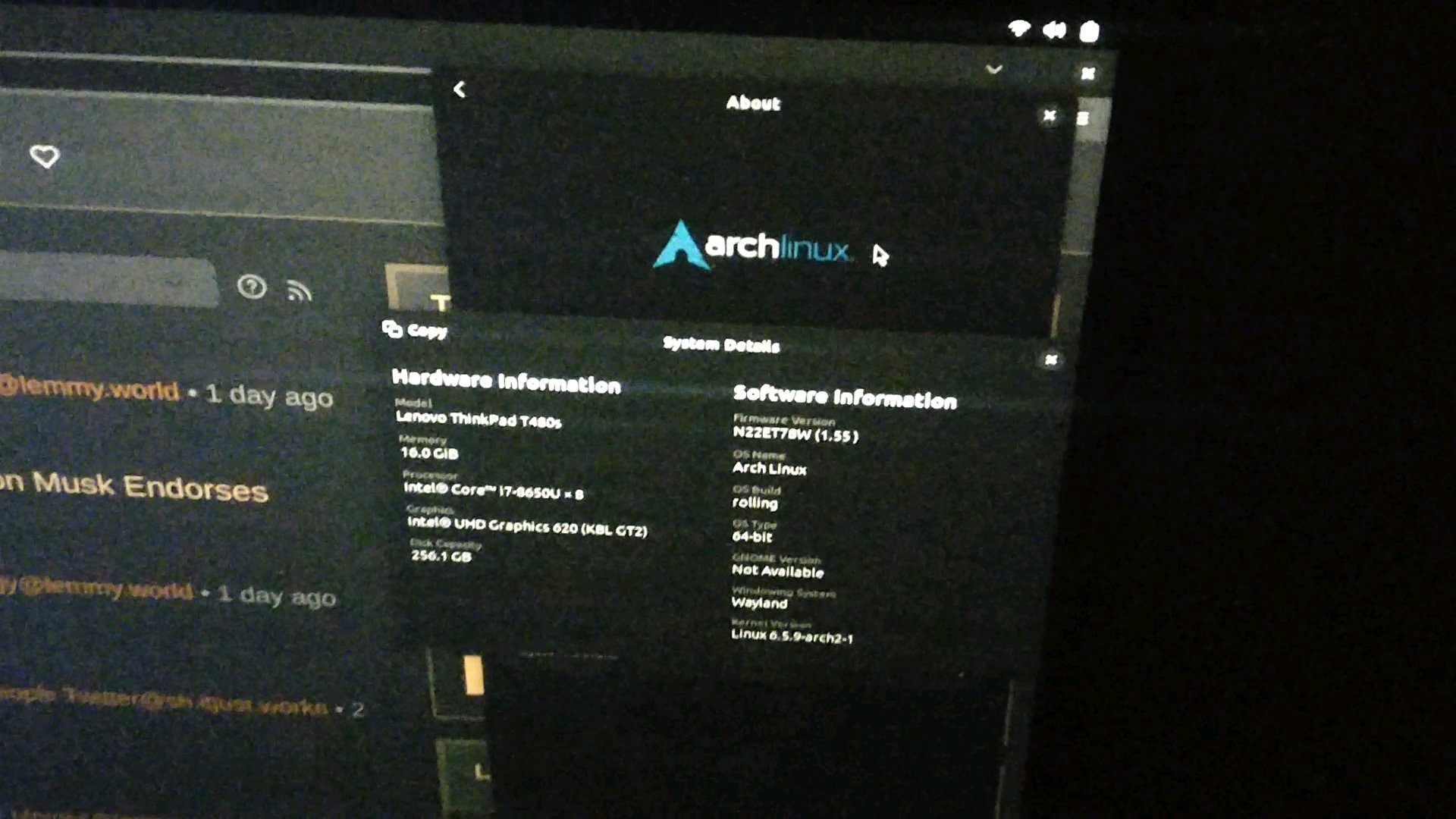Mastadon - @Devorlon@social.linux.pizza
- 2 Posts
- 22 Comments

 27·1 month ago
27·1 month agoImma break down their points and provide my own counter-arguments:
Client-Server model games can’t be client only because people could cheat
The publisher can provide the executable for the server portion of the client-server game at no cost to them.
The Crew was online only and had been running for 10 years, for it to continue running would cost Ubisoft more money and squeals provide the same experience with continued support
The publisher can provide the executable for the server portion of the client-server game at no cost to them.
Excessive red-tape / Government overreach
I like my government regulating massive corporations who exist in one of the largest industries, the move fast and break things mentality is detrimental to our society.
You bought a licence to the game not the game itself
That’s fucked up and shouldn’t happen. Why you ‘buy’ something, be it a game, movie, software, car, house. You should have the freedom to do whatever you want with it.
The initiative would damage live service games which provide value outside of just the game (online friendships).
Live service games can still do this under the initiative. Publishers might make less live service games but that’s their problem, not the consumers.
In the comments he adds counter-arguments to why publishers shouldn’t provide the server executable. Focusing on how monetisation would work:
If we don’t allow monetization - Who would be the party that enforces non-monetization of that server? If it’s the government I feel like we’re making an insane amount of red tape. If it’s the original company then this doesn’t work if they shut down.
If the company shuts down then it’s no longer an issue because no-one is losing money from the game servers now being monetised.
If we don’t allow monetization - Who is going to pay for the hosting if the servers cannot be monetized? If they cannot be monetized then these servers will also eventually shut down due to cost. We don’t up preserving games like this we just shift their death down the road.
The community, there are entire operating systems that are provided by volunteers for free with no advertisements. Providing the server executable does not shift their death down the road as anyone can run it going forward.
If we do allow monetization - This leads to a really weird attack potential if people can monetize the servers. You make an awesome game that has a small community. I want to monetize that game and run my own servers. I create a shitload of bots and constant exploits to erode the game and your business. Your business closes and you now have to give out server binaries to keep the game in a playable state. I can now profit off your work via private servers. This isn’t unlikely as we’ve seen mass attacks such as with TF2 We actually see echoes of this in the mobile market already as well. The only defense right now is DMCA or other takedown measures. Devs legitimately have very little protections as-is and this would erode that further. This creates an incentive for abuse where the abuser is protected as they are within their legal right to operate said “abandoned” games servers.
An odd straw-man, as for a small studio to develop a free to play, live service game to then have their game targeted by nefarious actors using a denial of service attack will only happed if the game is popular / good, in which case the developers should be making enough money to invest in protections against said actors, e.g. the IPs can be tracked and forwarded to the relevant authorities as orchestrating a denial of service attack is a crime.
That scenario isn’t anything like the TF2 situation, whose bots are ran by frustrated community members in an effort to have Valve continue updating TF2. Private servers can also be ran for TF2 as I write this, and the game is still being ran by Valve.
The only defence isn’t takedown measures, since the developer is running the game, as Thor said in the video, the developer can ban the bots.
Did you try taking the mobo out the case and testing it, the CPU and RAM? If you did and it’s still not working, then I’d follow u/dcdc’s advice and update the bios, the board could be on an early build that doesn’t support your RAM.
Here’s a link to updating your BIOS without posting.
And the latest (non beta) BIOS link.
Your board has a debugging code at the bottom, do they light up?
If they do, you can find the number in the manual
If they don’t light up, then I’d assume the board isn’t getting power, try removing the mobo from the case and check if you’ve got any case standoffs in places where they’d touch the mobo.
Your CPU has integrated graphics, so while the motherboard’s out try testing it with just the CPU, RAM and PSU.
If it still doesn’t work you might have to try using a different mobo / try and get an RMA on your current.

 9·1 month ago
9·1 month agoNews just in, people are more productive using tools they’re familiar with.

 213·1 month ago
213·1 month agoI really like their local translation models. Simply saying “no AI!” feels very luddite to me for such a broad category.

 1·2 months ago
1·2 months agoYe, it should always be clarified that while there is no physical / chemical addition, physiological addictions can also be detrimental and hard to break and WILL have negative side affects.
A litmus test I ask, is if someone consumes a lot of something that provides an easy dopamine hit (games, processed sugars, alcohol, etc) and if so warn them them to track their intake and take regular breaks (currently on one myself).

 3·4 months ago
3·4 months agoAlso, the petitions committee told the Tories that their response was bullshit and they needed to give a proper one. But that doesn’t really matter because of the whole new government thing.

 4·4 months ago
4·4 months agoThis is the first comment I’ve found talking about a game I’ve played. Had a lot of fun playing cannon brawl it feels wrong to downvote your comment.

 2·6 months ago
2·6 months agoAre your monitors all the same resolution, refresh rate and size?

 1·9 months ago
1·9 months agoI really want to be a part of good open-source projects
I get it, though I try to remind myself that perfection is the enemy of good. Especially in comparison to Discord which makes its money through [???] and is somehow only getting worse.

 1·9 months ago
1·9 months agoI based my assumptions on the parts in Revolts privacy policy, since reading the privacy policy of hCatpcha it alludes that each ‘vendor’ can select how much data they’d like to collect I assumed that Revolt only allowed them to collect IP, length of time on site and mouse movements. While they do sell information, they claim it to be anonymised and I contacted support to see how they did that for IP addresses.

Which is why I don’t really mind. The information they have of me is at most how my cursor moved, how long I took to Submit a login request, Submit a registration request, Submit a password reset / email resend request and an obfuscated IP. Seems OK to me.

 1·9 months ago
1·9 months agoThat’s the part of hCaptchas policy that’s relevant to Revolt.
For the analysis, hCaptcha evaluates various information (e.g. IP address, how long the visitor has been on the website or app, or mouse movements made by the user). The data collected during the analysis will be forwarded to IMI.

 1·9 months ago
1·9 months agoDoesn’t seem that bad, when you go to log in it checks your IP, length of time on the site and mouse movements.
hCaptcha
This section has been adapted from hCaptcha’s documentation.
We use the hCaptcha anti-bot service (hereinafter “hCaptcha”) on our website. This service is provided by Intuition Machines, Inc., a Delaware US Corporation (“IMI”). hCaptcha is used to check whether the data entered on our website (such as on a login page or contact form) has been entered by a human or by an automated program. To do this, hCaptcha analyzes the behavior of the website or mobile app visitor based on various characteristics. This analysis starts automatically as soon as the website or mobile app visitor enters a part of the website or app with hCaptcha enabled.
When using the Revolt App, hCaptcha will only begin analysis when you:
Submit a login request. Submit a registration request. Submit a password reset / email resend request.For the analysis, hCaptcha evaluates various information (e.g. IP address, how long the visitor has been on the website or app, or mouse movements made by the user). The data collected during the analysis will be forwarded to IMI.
Data processing is based on Art. 6(1)(f) of the GDPR (DSGVO): the website or mobile app operator has a legitimate interest in protecting its site from abusive automated crawling and spam. IMI acts as a “data processor” acting on behalf of its customers as defined under the GDPR, and a “service provider” for the purposes of the California Consumer Privacy Act (CCPA). For more information about hCaptcha and IMI’s privacy policy and terms of use, please visit the following links: https://hcaptcha.com/privacy/ and https://hcaptcha.com/terms.

 10·11 months ago
10·11 months agoThere have been cases [1] where vulnerabilities in software have been found, and the researcher that found it will contact the relevant party and nothing comes of it.
What they’re suggesting is that the researcher who discovered this might have already disclosed this in private, but felt that it wasn’t being patched fast enough, so they went public.
What does Israel have to do with this?
I’ve not seen any of these arguments. Though it may be all downvoted to hell and back.
My main gripe with adding privacy features to Lemmy is that the whole point of Lemmy is that all data is already publicly available and for Lemmy to continue working the way it does it’ll need to remain that way. And because of that there’s nothing that can be done to stop bad actors setting up an instance and selling all the data they collect.
At least in the EU (and UK to a lesser extent) no major corporation would be able to get away with selling that data, so the spent man hours on allowing privacy settings would be wasted time.

 838·1 year ago
838·1 year agoIsn’t it a benevolent dictatorship with Linus at the head?
I’ve just finished watching Generation Kill on a Thinkpad T480s (i7-8650u). It was plugged into the TV, and it plus the laptops screen worked fine.
Running arch, gnome, wayland





Obligatory
https://www.youtube.com/watch?v=AbSehcT19u0